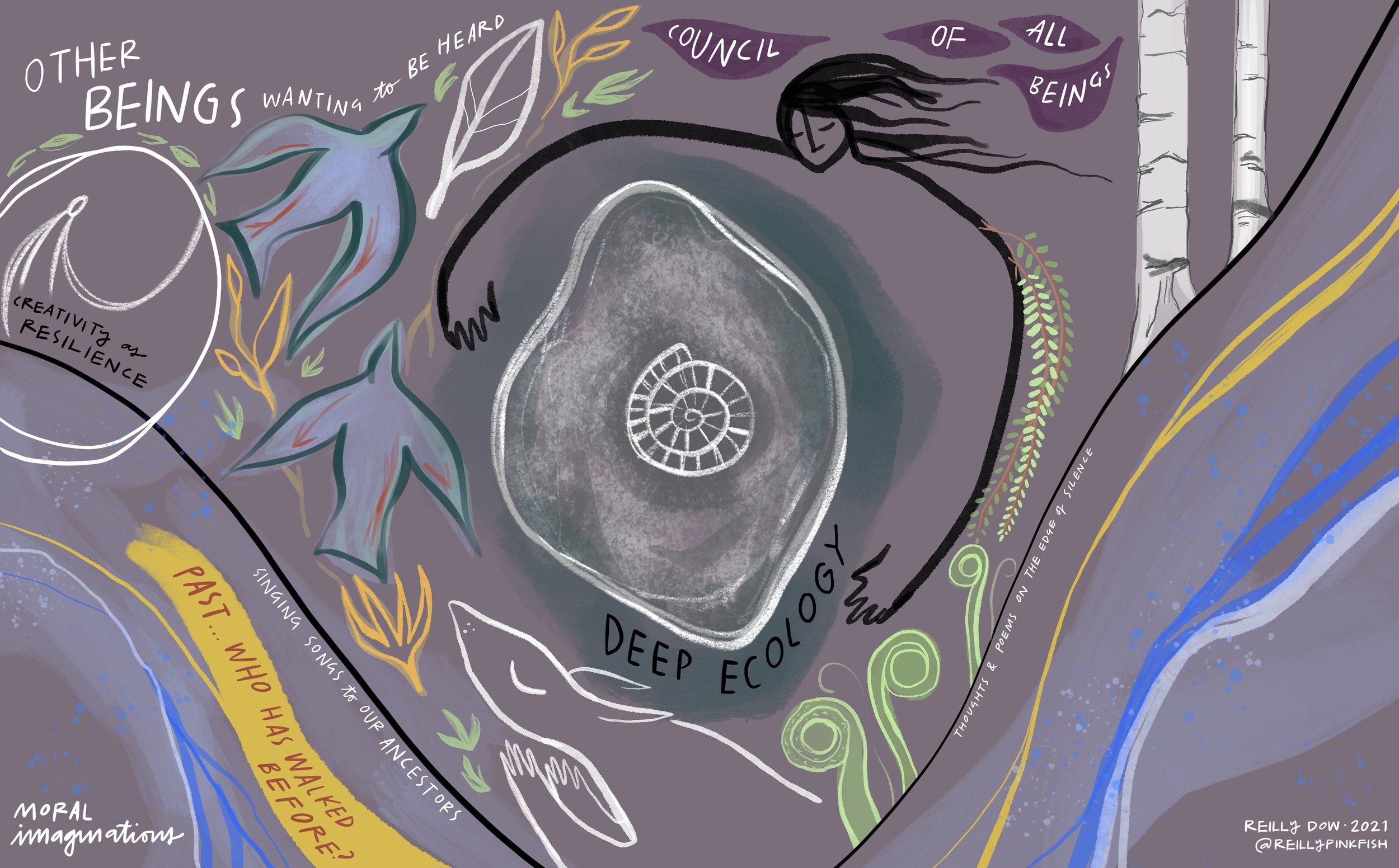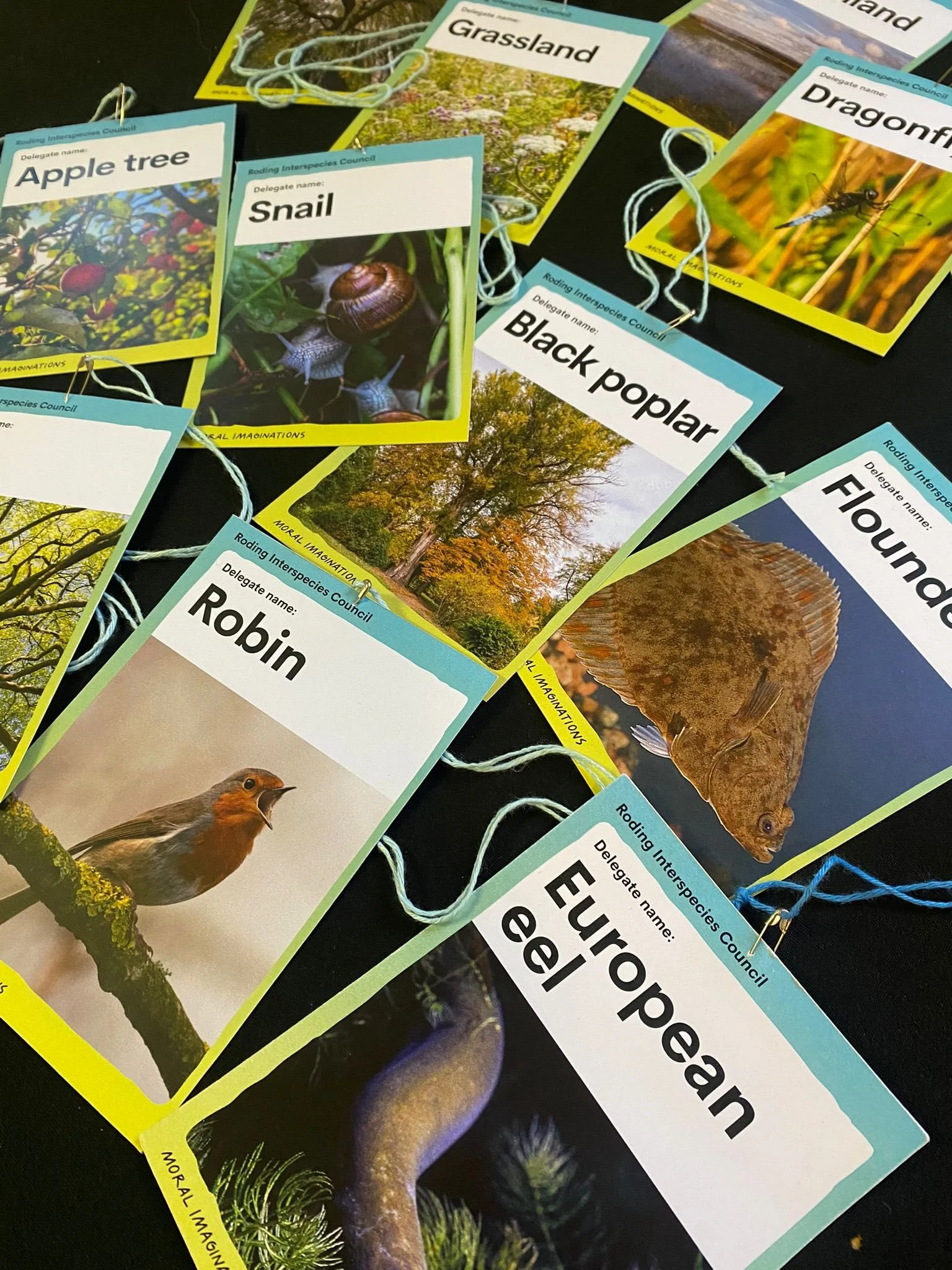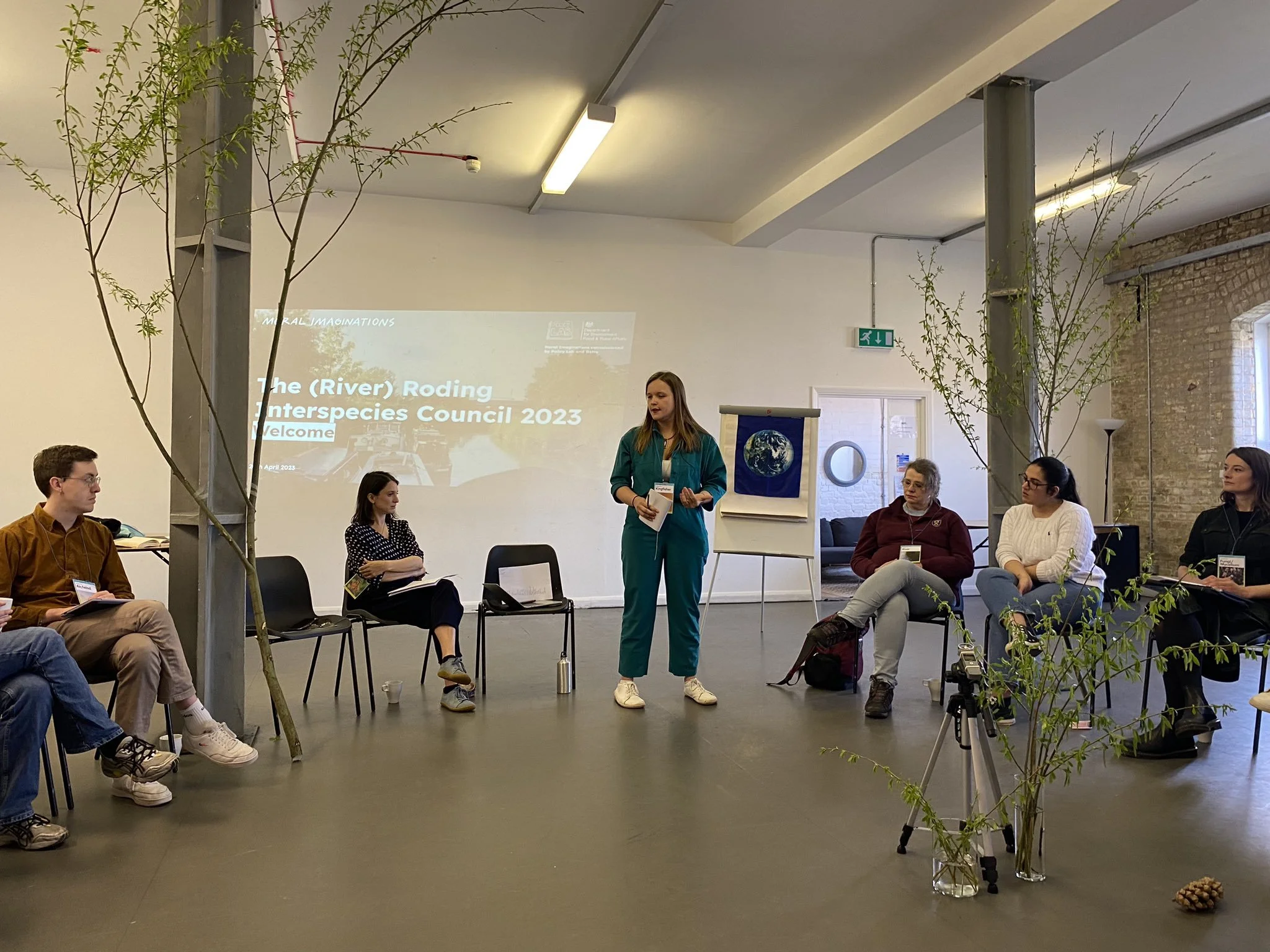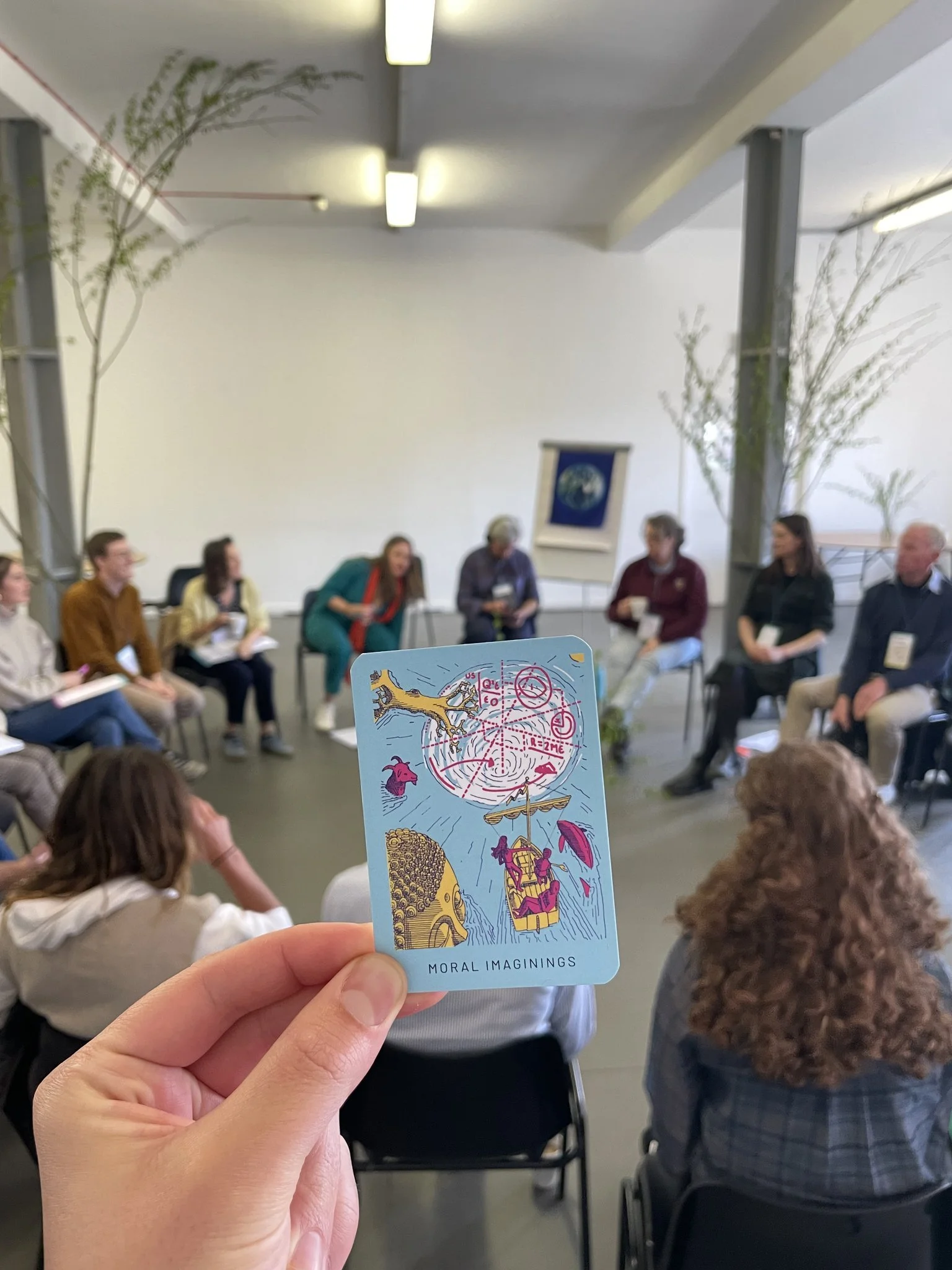
The ‘Interspecies Council’ is a methodology created by Phoebe Tickell in 2021 to introduce more-than-human ontologies and perspectives into decision-making and policy-making. It is a transformative group practice which can be used in organisational, community and government settings.
The Interspecies Council is a pioneering method considered part of the Rights of Nature approach, as well as ‘more-than-human governance,’ or ‘nature-centric governance’, which has emerged in response to human-centric decision-making approaches that contribute to ecosystem degradation and environmental pollution. This approach seeks to address these issues by broadening the scope of governance to include the perspectives of non-human entities and the natural world.
Lineage of the Interspecies Council
The ‘Interspecies Council’ was developed by Phoebe Tickell and has been stewarded into being by the team at Moral Imaginations, and was prototyped and developed during workshops in 2021 and 2022, and first shared publicly in 2023. Since then, there have been many occurrences of Interspecies Councils proliferating around the country. In essence, the Interspecies Council is an adaptation of ‘The Council of All Beings’ from the work known as The Work That Reconnects, with the permission and trust from Joanna Macy to steward this practice for decision-making settings, using an approach similar to a citizens assembly. The aim of the Interspecies Council is to bring the voice of nature and non-human beings into organisational decision-making, governance mechanisms and policy development. It is a participatory, democratic, semi-improvisational practice guided by facts and real-world issues, brought alive by roleplay, improvisation, theatre, arts, imagination and sensing.
This methodology was inspired by Phoebe’s time learning from and studying with the American Buddhist scholar and environmental activist Joanna Macy in the lineage of ‘The Work That Reconnects’, in particular her exercise ‘The Council of All Beings’ and it was developed with her support, guidance and blessing. It takes roots both in the deep ecology movement and in ways of knowing and being in relationship that have been stewarded by indigenous traditions since time immemorial.
We’re deeply grateful to Joanna for entrusting us with this practice and continue to steward its lineage while evolving it into a form that stands on its own. The Interspecies Council, now held by Moral Imaginations as a not-for-profit, is intentionally distinct from the Council of All Beings (a grief practice). Instead, the Interspecies Council is an arts-based, roleplay decision-making practice. However, we’re maintaining a connection between the two.
Rather than a discussion about nature, it becomes a discussion from the point of view of nature.
The Interspecies Council supports and encourages a profound shift in worldview and perspective, and asks us to decenter our human selves and interests for the purpose of empathy, connection and care with the living world around us. It is a practice and methodology that both catalyses a shift in worldview in those who participate, and also works as a practice that, repeated over time, strengthens the muscle of more-than-human empathy and connection.
The Value of Integrating More-Than-Human Voices into Governance
More-than-human thinking asks us to engage with the needs of both humans and other species in decision-making, recognising that our actions have an impact beyond people-centred considerations. Participants discuss the problems facing the ecosystem/place from the point of view of the ecosystem/place itself and its wildlife, bringing non-human beings into political decision-making.
As a tufted duck, we are excluded from the river… Humans are partitioning off different areas. We could never tell them ‘you’re not allowed in some part of your city’.
— Voice of the Tufted Duck, from the River Roding Interspecies Council
As developing policies require thinking far into the future, mitigating risks and planning with uncertainty, imagination can help us experiment, test what works and identify what can be explored further.
For people taking part in it, the Interspecies Council acts as a leveling tool, bringing people with different roles and experiences together and allowing them to find common goals. It can highlight areas of tension which then prompts reflection about potential solutions and compromises. It also sparks new conversations and provokes thinking by bringing different possibilities to life.
In the words of our founder and director, Phoebe Tickell:
“The shift we are making is from seeing nature as separate from human beings, to seeing that non-humans and humans are all a part of nature. It takes a leap of imagination, but many of the participants reflected that once they made the jump, it became quite easy, and they discovered a whole different perspective. By using radical imagination, we can start to bring a voice of non-human species into our meetings, boards, and design processes.”
Hosting an Interspecies Council
The Interspecies Council is a unique methodology developed by Moral Imaginations to bring the voices of the more-than-human world into decision-making and dialogue. This practice requires careful facilitation, deep listening, and an ethical commitment to honouring the integrity of the process.
To ensure the quality, depth, and integrity of the experience, only trained facilitators are authorised to deliver an Interspecies Council. Facilitators undergo specialised training in our methodology to cultivate the necessary skills, ethics, and sensitivity required for guiding this work.
If you are interested in hosting or facilitating an Interspecies Council, we invite you to explore our training and certification programmes. Please contact us using our contact form for more details.
The Interspecies Council
Lineage and licencing
The Interspecies Council is a licensed under a Creative Commons Non-Commercial (CC BY-NC 4.0) Licence. This requires that when using the framework, it is attributed (using TASL: Title, Author, Source, and License) and it isn't used for commercial purposes without our direct involvement. The reference is "Interspecies Council, created and stewarded by Phoebe Tickell at Moral Imaginations, CC BY-NC 4.0", linking to our website: www.moralimaginations.com.
If you’d like to understand more about this licence, and why we have chosen it, please get in touch. We feel strongly about stewarding this work in a way that is ethically aligned and maximises its sharing, while maintaining the lineage and rigour of the approach.
The reason we are choosing this licence is to build out a Moral Imagining Commons, which sits internationally and enables people to make iterations and adaptations to the Framework, always referring back to the community to contribute their modifications to the Commons. This approach sits with our values of peer-to-peer and commons building and allows us to build a community of facilitators and licensed practitioners around the work who can support each other, connect each other to opportunities, and adapt the work to new contexts. The method needs to be referenced, so that it can connect back to the Commons and allows us to build the methodology and ensure its integrity (with originators and lineage holders like Joanna Macy) as it develops. There is no cost to making a reference, and it goes against the capitalistic culture of individualistic gain.
Projects
The River Roding Interspecies Council
In April 2023, Moral Imaginations was funded by Policy Lab UK and DEFRA (Department for Environment, Food and Rural Affairs) Futures to support the organisation of an Interspecies Council with civil servants, local councillors, non-profit workers, activists and residents of the River Roding. It was part of the Water Post 2043 project aimed at “exploring what decision-making in relation to the freshwater system could look like post 2043, if transformed”.
24 participants were brought together, including stakeholders with a professional or community interest in the local area, to consider the more-than-human perspectives. This translates as imagining and empathising with the needs of some of the species living in and around the river Roding. Each participant was given a different animal, or part of the natural world to represent in discussions.
Some of the key themes discussed were human chauvinism, interspecies solidarity, human control of the environment, destruction of the river banks, segregation and division of species, colonisation of the land with human settlements, and a lack of understanding of the non-human lens.
The three biggest problems identified by the Council dealt with:
Human mindset and values: the need for humans to understand the river in systemic terms, to spend less time monitoring the river and giving more space for nature to heal and flourish.
Making the river whole: the fragmentation of the River Roding, both through physical barriers that impede the flow of the river and through human attempts, creates an artificial segregation between habitats and species.
Protecting all species: all species of the Roding should be cared for, not just those that are especially charismatic, or officially ‘protected’ or ‘native’.
Whilst tracking the impact of this work, we saw an appetite for people to keep engaging, both with each other and the river Roding, weeks after the Council had taken place. A legacy effect of more-than-human empathy developed: almost all participants reported a noticeable, lasting change within their perception or feelings towards nature, the world or themselves in the week after the Council. For example for Phillip Tovey, head of DEFRA Futures:
“I must admit I probably as much as anyone else went into this with a bit of skepticism, about [whether we could] just come out with the same insights if we weren’t thinking from the species perspective. But what I actually found was, when we started getting into interspecies dialogue with one another it really brought new insight into the whole way we think about how decisions should be formed with those different ecological relationships.”
Hosting an Interspecies Council can give a profound glimpse into how political decision-making might look when we decenter human interests and give equal weight to other beings with whom we share our waterways, soils and skies. It is an essential methodology to create pathways and strategies to place life back at the center of our governance systems, and help catalyse futures that are rooted in values, an expanded sense of connection to nature.
Watch the short video about the Council…
If you’d like to read/listen further…
Imagination Activism with policy makers: The River Roding Interspecies Council - Moral Imaginations (May 2023)
Join us in the next phase…
If you would be interested in partnering to bring an Interspecies Council into your community, project or organisation, please get in touch.



